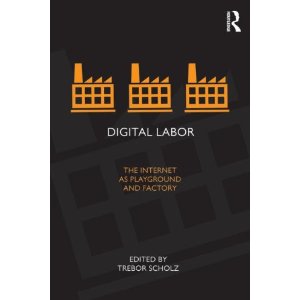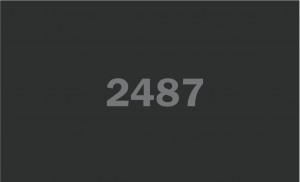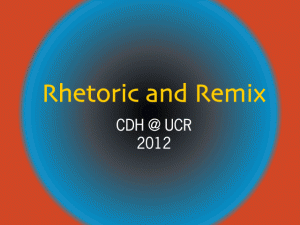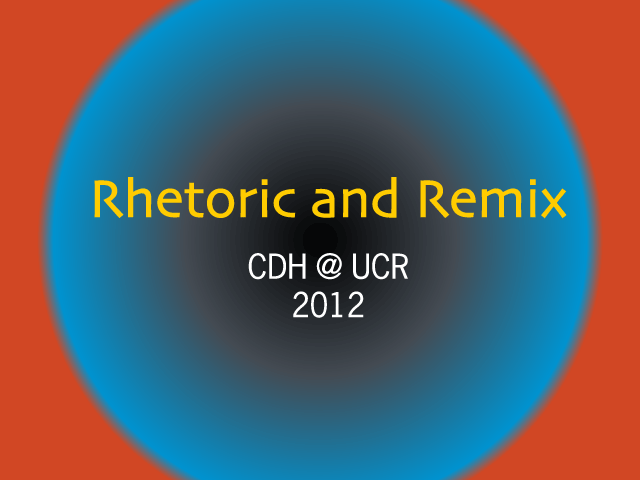Archive for
The Rhetoric & Remix Reading Group meeting today has been postponed.
The event will be rescheduled for the Winter quarter.
I made some changes to the website recently, and most of the changes are based on the new features of the WordPress Jetpack plugin.
1. I removed the Disqus commenting system.
– Disqus has been moving toward becoming a social network of its own, and there was just too much complexity being added to the commenting procedure.
– Comments are now handled solely within WordPress with the Jetpack plugin, and commenters can sign-in to make a comment with their Twitter, Facebook, or WordPress credentials.
– All of the old comments are still there too.
2. The Photon feature of the Jetpack plugin is now active.
– Using the Photon feature allows for integration of our WordPress.org installation with WordPress.com’s CDN (Content Delivery Network).
– This means that images and other information will load faster across the web.
3. We’re now using the Publicize feature of the Jetpack plugin for auto-posting to social networks.
– Previously we were using the “WP to Twitter” plugin which had some hiccups, but only because of Twitter changing their API. Hopefully there will be fewer missteps with the Jetpack plugin.
– Also, we were using Hootsuite to post to Facebook, but I didn’t like this setup. Hootsuite is okay for managing multiple social networking accounts (for a fee), but rather than using a direct-post to Facebook, Hootsuite relies on RSS. There would often be a delay of hours for the WordPress RSS to be read by Hootsuite, and then hopefully Hootsuite would send that info to Facebook. With the Jetpack Publicize feature, things are working much more quickly, and reliably.
– Sadly, Google+ still doesn’t have a public API available for auto-posting.
4. Backups of the site have been made – both a full FTP download, as well as an export of the site’s posts and info.
5. Lastly, I changed the social networking or sharing buttons so they show at the bottom of posts, but they do not show on the front page.
If anyone would like other changes or tweaks, please let me know.
This event has been rescheduled – please see this post for details:
http://cdh.ucr.edu/2013/01/06/rhetoric-and-remix-reading-group-rescheduled/
The Critical Digital Humanities group at UCR announces a reading group:
“Rhetoric & Critical Digital Humanities Scholarship: Rethinking Interactions with Digital Scholarship in terms of Agency, Rhetorical Address, and Reception”
The readings include three short articles from the recent collection Debates in the Digital Humanities and Bernard Stiegler’s book, For a New Critique of Political Economy. Participants should obtain the Stiegler book as we will be discussing it in its entirety.
This reading group will lay the foundation for an ongoing discussion about this year’s theme addressing the rhetoric of digital humanities scholarship.
WHEN: rescheduled for January 16th, 1-2:30pm
WHERE: English Department Conference Room . HMNSS 2212
lunch will be served!
This event is sponsored by the Center for Ideas and Society through a generous grant from the Andrew W. Mellon Workshops in the Humanities.
This is a fantastic conference that is devoted to interdisciplinary exploration of topics of concern to anyone working in, with, or around the digital humanities. The conference for next year is at Notre Dame and the deadline for submissions is April 15. Plenty of time to plan a panel!!
27th Annual Conference of the SLSA (Society for Literature, Science, and the Arts)
- POSTNATURAL?
- October 3-6, 2013
- The Campus of the University of Notre Dame
- Proposals due: April 15, 2013
Last year panels included papers by Katherine Hayles, Cary Wolfe, Mark Hansen, and plenty of non-celeb scholars who discussed questions of the “Non-Human” relative to literature, art, humanities generally, and science. They are open to panel proposals and individual papers.
Despite its title Stephen Marche’s article, “Literature is not Data: Against Digital Humanities,” is more against the algorithmic era we currently live in than the digital humanities. Marche writes that “algorithms are inherently fascistic,” but the concern is really about readability.
Algorithms are a tool for distant reading, as Marche states; however, the problem arises when algorithms need to be read themselves. A close reading of an algorithm is problematic, except of course for those mathematicians, computer scientists, and other professionals trained in such procedures. Overall, it is difficult to see whether Marche is really worried about the power wielded by the creators of the algorithms, or the social acceptance of relying on algorithms in general.
The irony of Marche’s misguided polemic is its underlying call for a greater understanding of the “smooth machines” that run the algorithmic code. Instead of being against the digital humanities, Marche is really pointing to a change in modern society, a detachment from the visceral world of the analog to the somewhat intangible, but very material world of the digital.
Marche’s anxiety expresses itself first through the amorphous nature of the burgeoning digital humanities. Marche then skewers academia, complains about Google, and shudders in fear of an electronic, financial armageddon. For Marche, literature is something to be handled, touched, and loved. Data, in contrast, is lifeless, meaningless, and untrustworthy.
Algorithms are not inevitable, and they are not perfect, but they are definitely part of the modern technological world we live in. The goal of the digital humanities is not to be “the next big thing,” but to understand the bigness of the algorithms that are already all around us.
SLSA 2013 CALL FOR PAPERS
The 27th Annual Meeting of the Society for Literature, Science, and the Arts (SLSA)
VENUE: The Campus of the University of Notre Dame
DATES: October 3-6, 2013
PAPER PROPOSAL DUE DATE: May 1, 2013
NOTIFICATION OF ACCEPTANCE: June 15, 2013
SLSA 2013 Site Organizer: Laura Dassow Walls, University of Notre Dame (lwalls@nd.edu)
Program Chair: Ron Broglio, Arizona State University (ronbroglio@gmail.com)
CONFERENCE THEME: POSTNATURAL?
What does it mean to come “after” nature? In 2012, Arctic ice melted to the lowest level in human history; with ice everywhere in retreat, island nations are disappearing, species vectors are shifting, tropical diseases are moving north, northern natures-cultures are moving into extinction. Acidification of ocean water already threatens Northwest shellfish farms, while historic wildfires, droughts, floods, and shoreline erosion are the norm. Reality overshoots computer models of global warming even as CO2 emissions escalate. Yet none of this has altered our way of living or our way of thinking: as Fredric Jameson noted, we can imagine the collapse of the planet more easily than the fall of capitalism. What fundamental reorientations of theory—of posthumanity and animality, of agency, actants, and aporias, of bodies, objects, assemblages and networks, of computing and cognition, of media and bioart—are needed to articulate the simple fact that our most mundane and ordinary lives are, even in the span of our own lifetimes, unsustainable? If we have never been natural, are we now, at last, ecological?
Proposals and papers on the theme or on any other SLSA-related topic are welcome. Proposed topics may take up any work in literature and science, history of science, philosophy of science, science and art, or science studies. “Postnatural” has been chosen as a theme to organize ongoing conference threads and to invite a range of proposals from various dimensions of ecocriticism and environmental literature and history.
Presentation proposals will be accepted through the SLSA website http://www.litsci.org, beginning in February, 2013. Individual proposals consist of a 250-word abstract with title. Pre-organized panels for consideration can contain an additional summary paragraph along with proposed session title.
SLSA MEMBERSHIP: Participants in the 2013 conference must be 2013 members of the Society for Literature Science and the Arts. For more information about SLSA, please visit the organization website at www.litsci.org.
Rhetoric and Critical Digital Humanities Scholarship: Re-thinking Interactions with Digital Scholarship in terms of Agency, Rhetorical Address, and Reception
What are the rhetorical assumptions made by “digital media scholarship” or the “digital humanities” in both the design and delivery of digital research? How are distinct rhetorical modes or histories entangled in, or excluded from, the interface and interaction designs developed for digital research projects and their presentation?
This year the Critical Digital Humanities research group begins with this fundamental question and our projects will work toward a consideration of the various impacts and affects of digital media.
For the 2012 – 2013 academic year, CDH will focus on what digital media’s particular language or discourse does, and how that language acts in relation to questions of agency. We will explore the rhetoric surrounding the digital humanities and the deployment of that rhetoric in the affective and commonplace experiences that drive digital media practices. CDH events will examine the primary tropes employed in digital media rhetoric as well as their subtexts, and how these factors allow us to think through digital media as an embodied practice.
One of the most common tropes of digital media is its claim of power – the power to democratize the social sphere, resulting in the increased agency of the user. However, in many ways, the construction and circulation of agency in digital media seems to serve the drives of neoliberalism rather than the individual.
Remix practices, interactivity, and social media all present opportunities for resistance to the challenges of neoliberal ideology, and the Critical Digital Humanities research collective will rethink notions of agency through practices of becoming and emergence within digital media.
 Digital Labor: The Internet as Playground and Factory
Digital Labor: The Internet as Playground and Factory
Edited by Trebor Scholz
Digital Labor asks whether life on the internet is mostly work, or play. We tweet, we tag photos, we link, we review books, we comment on blogs, we remix media, and we upload video to create much of the content that makes up the web. And large corporations profit on our online activity by tracking our interests, affiliations, and habits—and then collecting and selling the data. What is the nature of this interactive ‘labor’ and the new forms of digital sociality that it brings into being? The international, interdisciplinary contributors to Digital Labor suggest that there is no longer a clear divide between ‘the personal’ and ‘work,’ as every aspect of life drives the digital economy: sexual desire, boredom, friendship—and all become fodder for speculative profit. They argue that we are living in a total labor society and the way in which we are commoditized, racialized, and engendered is profoundly and disturbingly normalized by the dominant discourse of digital culture. Digital Labor poses a series of questions about our digital present: How is the global crisis of capitalism linked to the hidden labor of the digital economy? How do we address that most online interaction, whether work or play, for profit or not, is taking place on corporate platforms? How can we acknowledge moments of exploitation while not eradicating optimism, inspiration, and the many instances of individual financial and political empowerment? In response to these questions, this collection offers new definitions of digital labor that address and challenge the complex, hybrid realities of the digital economy.
Introduction: Trebor Scholz Why Does Digital Labor Matter Now? I. The Shifting Sites of Labor Markets
1. Andrew Ross On the Digital Labor Question
2. Tiziana Terranova Free Labor
3. Sean Cubitt The Political Economy of Cosmopolis
4. McKenzie Wark Considerations on A Hacker Manifesto II. Interrogating Modes of Digital Labor
5. Ayhan Aytes Return of The Crowds: Mechanical Turk and Neoliberal States of Exception
6. Abigail De Kosnik Fandom as Free Labor
7. Patricia Clough The Digital, Labor and Measure Beyond Biopolitics
8. Jodi Dean Whatever Blogging III. The Violence of Participation
9. Mark Andrejevic Estranged Free Labor
10. Jonathan Beller Digitality and The Media of Dispossession
11. Lisa Nakamura Don’t Hate the Player, Hate the Game: The Racialization of Labor in World of Warcraft IV. Organizing Networks in an Age of Vulnerable Publics
12. Michel Bauwens Thesis on Digital Labor in an Emerging P2P Economy
13. Christian Fuchs Class and Exploitation on the Internet
14. Ned Rossitter and Soenke Zehle Acts of Translation: Organizing Networks as Algorithmic Technologies of the Common
Sound Art and the Transborder Digital Memorial: Luz María Sánchez’ “2487” at the Riverside Art Museum
September 19th, 2012
Carolyn Schutten
 In conjunction with the Riverside Art Museum’s exhibition You Are Breathing in It: Alternative Art Practices (YABII), Luz María Sánchez’ 2487, a stereo installation from an 8-channel sound piece, is currently on exhibit in the RAM Alcove Hallway. The sound art installation was curated by Carolyn Schutten, a PhD student in public history from UCR, who took part in the Riverside Art Museum Student Curatorial Council (RAMSCC) pilot program.
In conjunction with the Riverside Art Museum’s exhibition You Are Breathing in It: Alternative Art Practices (YABII), Luz María Sánchez’ 2487, a stereo installation from an 8-channel sound piece, is currently on exhibit in the RAM Alcove Hallway. The sound art installation was curated by Carolyn Schutten, a PhD student in public history from UCR, who took part in the Riverside Art Museum Student Curatorial Council (RAMSCC) pilot program.
2487 speaks the names of the two thousand four hundred eighty seven people who died crossing the U.S./Mexico border . The work employs digital technology and sound as a means for transborder memorialization and protest, imposing the absence of those lost into the public sphere. Sánchez’ immersive sound environment remaps social history as the names of the deceased fly across the border through soundscape and digital media. Drawing from data acquired from activist websites, Sánchez created a sound map of names which she recorded digitally. Her final score, along with the database, has been exhibited widely but lives permanently on the world wide web, in commemoration and quiet protest. Sánchez’ work connects the digital and geographic landscape to the listener’s body, gaining entry through sound and transcending political and physical barriers.
Curator Carolyn Schutten will speak about 2487 and the curatorial process, along with the other RAMSCC students, during a panel discussion on September 21 at 6:00 pm. To RSVP please call 951-684-7111 or e-mail Exhibit Liaison Kathryn Poindexter at: ramexhibitions@riversideartmuseum.org.
2487 will be on exhibit from August 9 – September 26, 2012 in the Riverside Art Museum Alcove Hall. YABII will close on September 22, 2012.
For more information on Sánchez sound project, visit: www.diaspora2487.org
Luz María Sánchez’ 2487 was originally commissioned by Artpace San Antonio as part of the International Artist-in-Residence program New Works: 06.2, curated by Yuko Hasegawa, Chief Curator, Museum of Contemporary Art, Tokyo, Japan.





